GALLUP NEWS SERVICE
PRINCETON, NJ -- About one-third of the American adult population believes the Bible is the actual word of God and is to be taken literally word for word. This percentage is slightly lower than several decades ago. The majority of those Americans who don't believe that the Bible is literally true believe that it is the inspired word of God but that not everything it in should be taken literally. About one in five Americans believe the Bible is an ancient book of "fables, legends, history, and moral precepts recorded by man."
Belief in a literal Bible is strongly correlated with indicators of religion, including church attendance and identification with a Protestant or other non-Catholic Christian faith. There is also a strong relationship between education and belief in a literal Bible, with such belief becoming much less prevalent among those who have college educations.
Background
One's view of the authority of the Bible has been and remains a key focal point for many religions today.
Some denominations hold the belief in a literal Bible as a hallmark of their faith. The statement of "Faith and Mission" of the Southern Baptist Convention, for example, states that: " The Holy Bible was written by men divinely inspired and is God's revelation of Himself to man. It is a perfect treasure of divine instruction. It has God for its author, salvation for its end, and truth, without any mixture of error, for its matter. Therefore, all Scripture is totally true and trustworthy."
Although even those who believe in a literal Bible can still be at odds in their attempt to interpret exactly what the Bible says about key areas of Scripture and moral issues, a literal belief structure has been the basis for justifications for a variety of important positions in American life. These have included opposition to evolution and the teaching thereof in public schools (going back to the days of the Scopes Monkey Trial), opposition to same-sex relationships, the proper relationship between husbands and wives with a marriage, observance of a day of rest, the belief that positions as preachers or priests should be maintained for men only, and even such seemingly unrelated topics as immigration.
Americans' Opinions
Only about one-third of Americans today believe the Bible is absolutely accurate and that it should be taken literally word for word. The rest either feel that the Bible is the inspired word of God, but not literally so, or that it is a book of ancient fables, legends, and history as recorded by man.
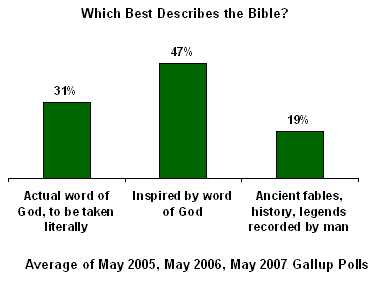
Americans' views on the Bible have not changed materially over the past 16 years. Gallup has asked this question about personal views of the Bible nine times since 1991. The percentage saying the Bible is the actual, literal word of God has remained in a relatively narrow range between 27% and 35% across this time period, with the average being 31%.
Prior to that point, however, the data suggest that Americans' belief in a literal Bible was slightly higher. Gallup asked the question seven times between 1976 and 1984, during which time an average of 38% said that the Bible is the actual word of God. At two points during this time period, 40% of Americans agreed with the literal interpretation view of the Bible.
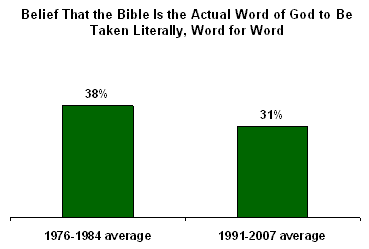
Belief in a Literal Bible Among Sub-Groups of the Population
To provide a larger and more stable sample for purposes of analyzing the distribution of beliefs regarding the Bible in the American population, we aggregated data from the last three surveys in which this Bible question was asked -- in May of 2005, 2006, and 2007 -- for a sample size of 3,010 interviews.
The analysis of these data shows one demographic variable that is highly related to views of the Bible -- education. The higher the level of education, the less likely the individual is to believe that the Bible is the actual, literal word of God.
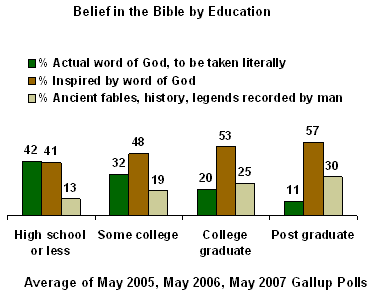
Even though those with postgraduate educations are much less likely to believe in a literal Bible, the majority of that group do believe that the Bible is the inspired word of God, rather than solely a human creation.
Those who identify as Protestants or other non-Catholic Christians are significantly more likely to believe that the Bible is the literal word of God than are Catholics. Not surprisingly, those Americans who say they have no religious affiliation are much more likely than the other groups to say that the Bible is a creation of humans. It is interesting to note, however, that 10% of those with no religious identification still believe the Bible is literally the word of God, and another 26% say it is inspired.
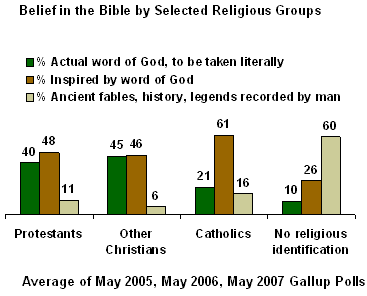
There is a predictable and highly significant relationship between self-reported church attendance and belief in a literal Bible. Fifty-four percent of those who attend church weekly believe the Bible is the actual word of God. That figure drops in a linear fashion as church attendance falls, to a low point of 8% who believe in a literal Bible among those who report never attending church.
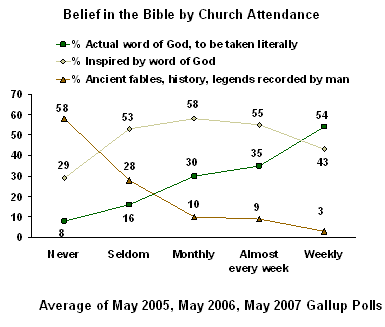
Church attendance is highest in the South, so it comes as no surprise to find that Southerners are most likely to believe in a literal Bible. Those in the East are least likely to believe in a literal Bible.
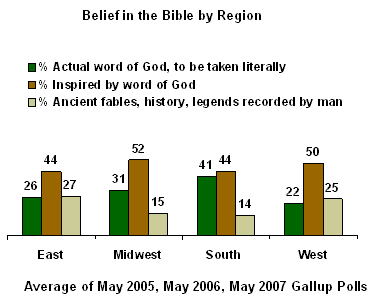
There is not a highly significant relationship between age and belief in a literal Bible.
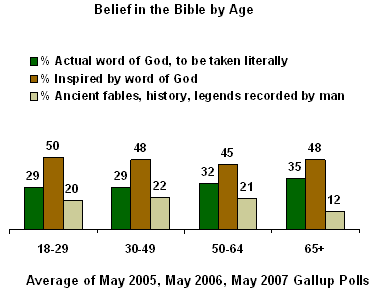
Survey Methods
Results are based on a series of surveys based on telephone interviews with approximately 1,000 national adults, aged 18 and older, conducted by Gallup. For results based on any one total sample of national adults, one can say with 95% confidence that the maximim margin of sampling error for any given survey is ±3 percentage points. For the aggregated group of interviews conducted between May 2005 and May 2007 used in portions of the above analysis, the maximim margin of sampling error is ±2 percentage points. In addition to sampling error, question wording and practical difficulties in conducting surveys can introduce error or bias into the findings of public opinion polls.
